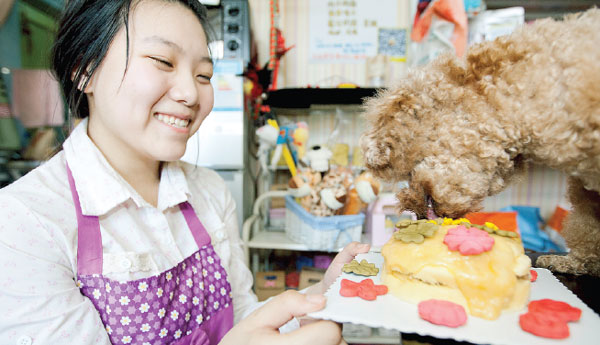Bet's on your pet
|
A baker holds a pet birthday cake made for her customer's dog in Changchun, Jilin province. It takes the baker about three hours to make the cake, priced around 100 yuan ($15). Liu Pengda / For China Daily |
Local brands and multinationals are out to tickle the tastebuds of cats and dogs, and make millions
Five years ago, dog-lover Song Yu decided to open her Paopao Pet Bakery in Beijing, claimed to be the first of its kind in China, to enable pet owners to pamper their furry companions with delicious and healthful treats.
"The idea was born because we wanted to get more dogs to eat fresh and healthful food," said Song. "Health is the most important thing for pet owners, so it's essential for them to buy high-quality food for their pets."
Despite the increasing consumer appetite for gourmet pet food products, it was not easy to get the business up and running at first. High costs forced Song to shutter the bricks-and-mortar store.
Now, though, the business is flourishing, thanks to its virtual storefront on Alibaba Group Holding Ltd's Taobao.com. Its focus is on personalized products designed for special occasions like pet birthdays.
Last year, the online pet food store netted more than 1 million yuan ($152,000) in sales.
"Online shopping is very convenient because we can reach any point in China with air deliveries," said Song. "This year, we will keep improving our online store and we will cooperate with more pet stores so that customers can order our products directly from pet stores' websites."
Customized pet birthday cakes enjoy high demand. Song produces more than 1,000 pieces every month.
Confections made with chicken meat are the most popular on the menu. But pet owners can also choose from a wide variety of ingredients such as beef, duck, vegetables and salmon.
Macaroons, cookies and cupcakes specially made to tickle dogs' tastebuds are also available.
Song expects this year's sales to soar as demand for premium and gourmet pet food products is on the rise.
Paopao exemplifies the two trends that are changing the pet food industry in China: The strong emergence of gourmet products and the increasing popularity of online retailing.
Industry experts said that Chinese consumers are now looking for healthful and pricier treats for their pets, thanks to awareness that pets need food with specific nutritional value.
Dog and cat populations have witnessed steady growth in China in the past five years. And sales of pet food products have almost doubled in the same period.
This year, sales of dog and cat food will likely increase by 10.65 percent to 4.57 billion yuan, according to London-based market research company Euromonitor International.
There is a great potential for further sales growth as experts estimate that 75 percent of pet owners in China still feed tablescraps to their pets.
In fact, Mintel calculated that sales of dog and cat food will grow to 7.1 billion yuan in 2020, thanks to higher disposable incomes.
Swiss food giant Nestle SA, owner of six pet food brands in China, including Dog Chow, Friskies, Cat Chow and Fancy Feast, notes pet food is a promising market in the country with an annual growth rate of 25 percent.
It plans to expand its distribution networks to reach smaller cities, and launch more wet food products to meet the demand for premium food.
"There is a huge opportunity to further explore the non-dry business in China. This includes wet food and treats," said Nancy He, a spokesperson for Nestle. "Although its scale is still relatively small, the growth is expected to be very fast."
US-based Mars Inc, renowned for its confectionery, owns several pet food brands including Pedigree and Whiskas. Mars, which is now the leading pet food producer in China, recently entered the premium market with several brands such as Eukanuba, Sheba and Cesar.
"We started manufacturing Eukanuba locally in China last year," said Carrie Fang, a spokesperson for Mars Petcare. "We are looking forward to providing the pet owners in China with multiple choices by introducing our diversified premium pet food brands."
Li Fangning, a young professional living in Beijing, spends 600 yuan a month on average to buy nutrition and other pet care products for her Simba, a two-year-old Bichon Frise, a dog breed known for its curly spongy hair and small built.
Li feeds Simba a combination of homemade pet food and imported premium pet food products, low in additives.
"I think Simba has better food than I do," Li joked, adding her pooch's health is her priority.
Li notes premium products currently available in the market are still not adequate. Which is why she cooks special meals for Simba.
Pet owners are picky about not only food but sales channels. These days, they prefer online shopping.
Simba's master Li explained that although pet stores are more reliable, they do not always have as many choices as online retailers.
Pet food e-shops have a strong potential for growth, and may well emerge as the second-largest distribution channel after physical shops, said Euromonitor in its latest pet food market report.
In fact, just like Paopao, other local pet food brands such as Bridge PetCare are seeing their sales grow on e-commerce websites such as Tmall.com and JD.com.
"E-commerce is driving the boom in pet foods," said He from Nestle. "Pet food has become one of the fastest-growing categories online next to infant and baby nutrition."
Mars Petcare, which has already teamed up with leading e-commerce platforms such as JD, Tmall, Yihaodian and Amazon, expects to invest more money in online channels and accelerate research in pet owners' shopping behavior.
"By providing customized product portfolios for online channels, we collected big data that helped us better understand consumers, and boost our growth in China," said Fang from Mars.
emmagonzalez@chinadaily.com.cn



















